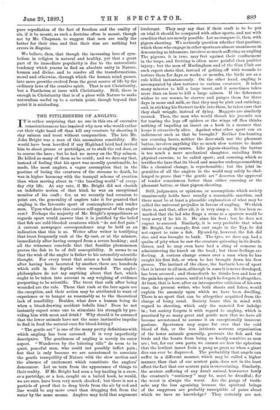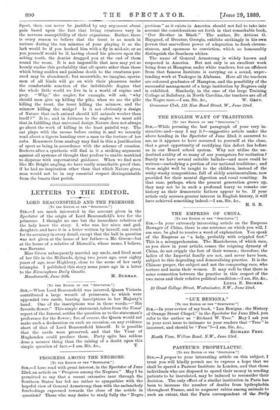THE PITILESSNESS OF ANGLING.
TT is rather surprising that no one in this era of excessive --I- conscientiousness has inquired why men who would rather rut their right hand off than kill any creature by shooting it slay salmon and trout without compunction. The late Mr. John Bright was a man of this anomalous sensibility. He -would have been horrified if any Highland laird had invited him to shoot grouse or partridges, or to stalk the red deer, or to course the hare ; but he had no mercy on the Tay salmon. He killed as many of them as he could ; and we dare say that, instead of feeling that his sport was morally questionable, he made, like most anglers, a vague assumption that in the pastime of luring the creatures of the streams to death, he was in higher harmony with the tranquil scheme of creation than when moving about in " the brawling world " of every- -day city life. At any rate, if Mr. Bright did not cherish an indefinite notion of that kind, he was an exceptional member of his craft ; for, as we recently had occasion to point out, the generality of anglers take it for granted that angling is the favourite sport of contemplative and tender men. Upon what does this curious self-approval of the angler rest? Perhaps the majority of Mr. Bright's sympathisers as regards sport would answer that it is justified by the belief -that fish are cold-blooded creatures which " do not feel pain." A current newspaper correspondence may be held as an indication that this is so. Writer after writer is testifying that trout frequently rush at the fly cast, or at the minnow, immediately after having escaped from a severe hooking ; and all the witnesses conclude that that familiar phenomenon proves the fish to be of dull susceptibility. It seems to us that the wish of the angler is father to his ostensibly scientific thought. For every trout that seizes a hook immediately after having been lacerated by another, there are hundreds which sulk in the depths when wounded. The angler- philosophers do not say anything about that fact, which ought to be taken into account in any weighing of evidence purporting to be scientific. The trout that sulk after being wounded are the rule. Those that rush at the lure again are the exception, and their action may be attributed to want of 'experience or to hunger as reasonably as to the theoretical lack of sensibility. Besides, what does a human being do when a blood-drawing accident befalls him? Does he not instantly expect some one to stimulate his strength by pro- viding him with meat and drink ? Why should it be assumed -that the lower animals have not the same instinctive impulse to find in food the natural cure for blood-letting ?
" The gentle art " is one of the many pretty definitions with which angling has been caressed. It is very imperfectly descriptive. The gentleness of angling is merely its outer aspect. " Wanderers by the loitering rills" do seem to be quiet, peaceful men, who could not possibly inflict pain ; but that is only because we are accustomed to associate the gentle tranquillity of Nature with the slow motion and The absence of excitement which constitute the anglers' demeanour. Let us turn from the appearance of things to their reality. If Mr. Bright had seen a boy hauling in a crow, .or a partridge, or a hen, caught on a baited hook, he would, we are sure, have been very much shocked ; but there is not a particle of proof that to drag birds from the air by rod and line would be any more cruel than dragging fish from the water by the same means. Anglers may hold that argument
irrelevant. They may say that if their craft is to be put on trial it should be compared with other sports, and not with cruelties that are merely possible. Let us compare it, then, with pigeon-shooting. We seriously question whether that pastime, which those who engage in other sports are almost unanimous in denouncing as inhumane, involves so much suffering as angling The pigeons, it is true, may fret against their confinement in the traps, and fretting is often more painful than positive injury; but the men of Hurlingham and of the Gun Club are such expert shots that, instead of getting off with wounds to torture them for days or weeks or months, the birds are as a rule killed instantaneously. On the other hand, angling is accompanied by slow tortures to various creatures. It takes many minutes to kill a large trout, and it sometimes takes more than an hour to kill a large salmon. If the fisherman wishes to use worms, he starves and purges them for three days in moss and milk, so that they may be pink and enticing ; and, in sticking his Stewart tackle into them, he takes care that they shall wriggle, instead of dying. Maggots are similarly treated. Then, the man who would thrash his juvenile son for tearing the legs off spiders or the wings off flies thinks nothing of impaling an insect on a hook in a manner that keeps it attractively alive. Against what other sport can an indictment such as that be brought ? Neither fox-hunting nor coursing hares, neither the deer-stalk nor the pheasant battue, involves anything like so much slow torture to dumb animals as angling causes. Like pigeon-shooting, the battue is too much a mere mechanical slaughter, entailing little physical exercise, to be called sport; and coursing, which so terrifies the hare that its blood and muscles undergo something like a chemical change, is reprehensible ; but the joint in- gem:tides of all the anglers in the world may safely be chal- lenged to prove that " the gentle art " deserves the approval of tender consciences better than either coursing or the pheasant battue, or than pigeon-shooting.
Still, judgments, or opinions, or assumptions which society unanimously holds have usually a reasonable sanction, and there must be at least a plausible explanation of what may be called the universal prejudice in favour of angling. We think there is, and that, after all, it is very simp:e. It has been re- marked that the lad who flings a stone at a sparrow would be very sorry if he hit it. He aims his best ; but. he does not expect to succeed. Similarly, it is very probable that when Mr. Bright, for example, first cast angle in the Tay, he did not expect to raise a fish. By-and-by, however, the fish did rise, and was brought to bank. The tyro, we dare say, had a qualm of pity when he saw the creature quivering in its death- throes, and he may even have had a sting of remorse in administering the knock on the head ; but those feelings are fleeting. A curious change comes over a man when he has caught his first fish, or when he has brought down his first grouse. The instinct of the chase, the barbaric love of sport that is latent in all men, although in some it is never developed, has been aroused ; and thenceforth he thinks less and less of the pain his sport causes, until at length he forgets it altogether. At least, that is how, after an introspective criticism of his own case, the present writer, who both shoots and fishes, would explain the anomaly upon which we have been dwelling. There is no sport that can be altogether acquitted from the charge of being cruel. Society bears this in mind with regard to shooting, which only the unnoted few indulge in ; but society forgets it with regard to angling, which is practised by so many great and gentle men that we have all become accustomed to assume it an exceptionally innocent pastime. Sportsmen may argue for ever that the cold blood of fish, or the less intricate nervous organisation of the lower animals generally, prevents the fish and the birds and the beasts from being so keenly sensitive as men are ; but, for our own parts, we cannot see how the aphorism that the lowliest insect feels a pang as great as when a giant dies can ever be disproved. The probability that angels can suffer in a different manner, which may be called a higher manner, than that of our acutest pain, does not in the least affect the fact that our acutest pain is excruciating. Similarly, the acutest suffering of any dumb animal, howsoever lowly the creature's "sentiency" may be, must be dreadful ; for the worst is always the worst. Are the. pangs of tooth- ache any the less agonising because. the spiritual beings of the empyrean are probably susceptible of pains about which we have no knowledge ? They certainly are not
Sport, then, can never be justified by any argument about pain based upon the fact that living creatures vary in the nervous snsPeptibility of their organisms. Rather, there is every reason to believe that the trout is as much in torture during' the ten minutes of your playing it as the lark would be if you hooked him with a fly in mid-air, or as you yourself would be if, having closed his pincers upon the aching tooth, the dentist dragged you at the end of them round the room. It is not impossible that men may yet so keenly realise this probability that all sports other than those which bring sudden and painless death to the creatures pur- sued may be abandoned; but meanwhile, we imagine, sports- men of all kinds will go on with their pleasures under the comfortable sanction of the indubitable dogma that the whole little world we live in is a world of rapine and prey. " Why," the angler, for example, will ask, " why should men give up killing the pike, when we see the pike killing the trout, the trout killing the minnow, and the minnow killing the midge ? Is it not obviously a design of Nature that each animal should kill animals weaker than itself ?" It is ; and in fairness to the angler, we must add that in fulfilling that universal design Nature does not always go about the work of killing in the least painful way. The cat plays with the mouse before eating it, and we recently read about a tigress handing over a man to the torture of her cubs. Beasoners from analogy may find in this a justification of sport as being in accordance with the scheme of creation. Seekers after a synthesis will find in it a striking argument against all systems of thought that profess to enable mankind to dispense with supernatural guidance. When we find men like Mr. Bright angling, we have really remarkable proof that, if he had no inspiration other than that which Nature gives, man would not be in any essential respect distinguishable from the beasts that perish.



































 Previous page
Previous page